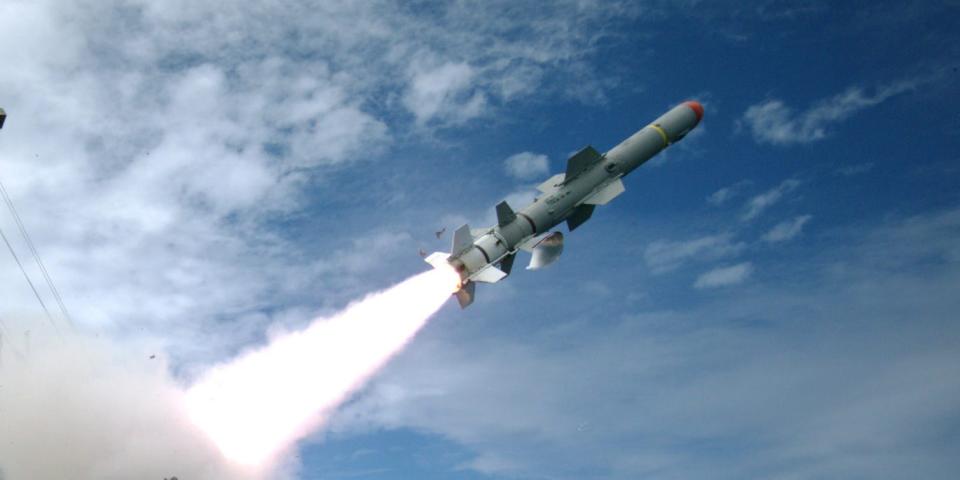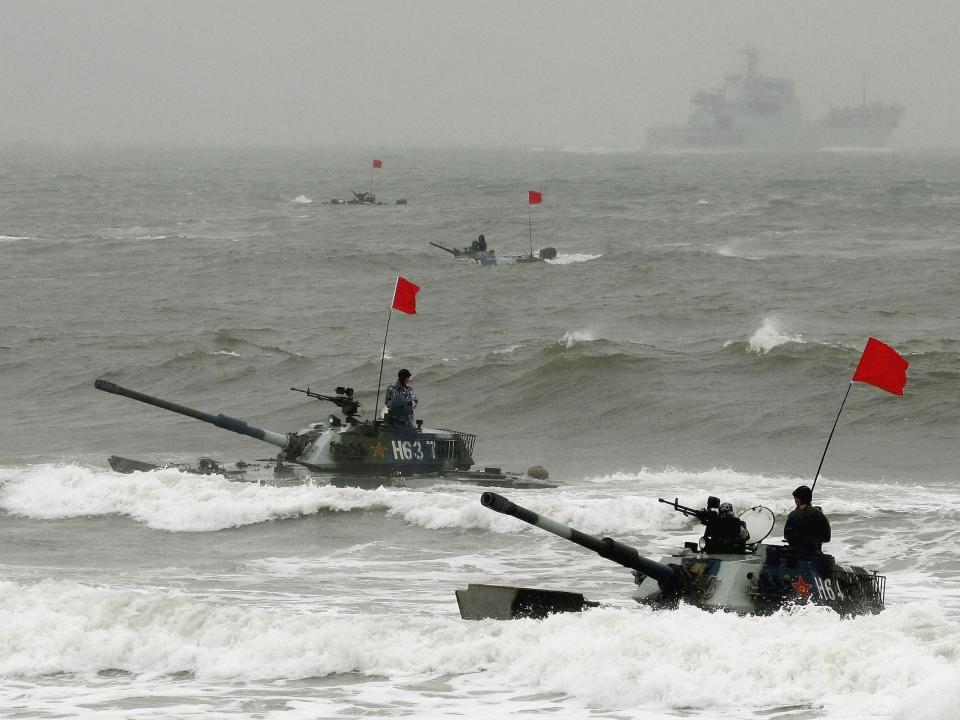A Chinese invasion of Taiwan would not be easy, and the 400 anti-ship missiles the US plans to sell to Taiwan would make it even harder

Days after a proposed $1.8 billion arms sale to Taiwan, the US State Department notified Congress of a possible $2.4 billion sale of hundreds of Harpoon anti-ship missiles and launchers to the island, which faces rising pressure from mainland China.
With one of the world's largest militaries, China could destroy Taiwan if it really wanted, but taking the well-defended island is a lot more complicated. Harpoon anti-ship missiles could frustrate an amphibious assault, a likely requirement for a successful invasion.
Arms sales to Taiwan have angered Beijing, which argues that they are a challenge to its national interests and has threatened to retaliate.
If Taiwan gets its hands on the hundreds of anti-ship missiles the US has proposed selling to the island, it could frustrate a future Chinese invasion.
Less than a week after it authorized a $1.8 billion arms sale to Taiwan, the US Department of State notified Congress on Monday of another possible Foreign Military Sale to Taiwan for $2.4 billion that includes hundreds of Harpoon anti-ship missiles and launchers.
The big sale, if approved by Congress, would give Taiwan 100 Harpoon Coastal Defense Systems (HCDS) and 400 RGM-84L-4 Harpoon Block II Surface-Launched Missiles, very capable all-weather weapons that can search for and take out ships as far as half-way across the Taiwan Strait.
Taiwan's Ministry of Defense first expressed an interest in purchasing these weapons back in late May.
Related video: Why China loves Tesla
US arms sales to Taiwan are not uncommon, and they achieve a few different things. They send political signals to that reassure Taipei and warn Beijing. They also fulfill the demands of the Taiwan Relations Act, and they offer increased military capability as Taiwan faces off against China's growing military might.
The Harpoon anti-ship missiles in particular would throw a big wrench into China's plans to invade Taiwan in the event that Beijing abandoned hopes of a peaceful reunification. Beijing has never renounced the use of a force as an option for achieving reunification.
"If the Chinese are serious about taking Taiwan, a key part of any effort would involve an amphibious assault because you can only drop so many paratroopers," Dean Cheng, an Asian studies expert at the Heritage Foundation, told Insider. "And, paratroopers are usually lightly armed. You need to land amphibious forces, which will bring heavier units ashore."

China isn't ready for a full-scale invasion ... yet
Pulling off a large cross-strait invasion is easier ordered than executed.
Amphibious landings are among the toughest military operations, and to make matters worse, the Taiwan Strait is rough and often stormy. Cheng said that a Chinese invasion would be "an amphibious assault across one hundred miles of some of the worst waters in the world."
Those challenges aside, the Chinese military lacks a sufficient number of the amphibious warships required to put large numbers of troops ashore. "They've had literally only a handful of ships, nowhere near enough by our estimation, to go and launch D-Day," Cheng said.
But, China has started investing more heavily in these types of ships. China launched its first Type 075 amphibious assault ship last fall, and more are under construction. Cheng said "a group of them could put a fair amount of firepower ashore."
The US Department of Defense reported in its recent China Military Power Report that China "has the largest navy in the world." The report also states that China "is the top ship-producing nation in the world by tonnage and is increasing its shipbuilding capacity and capability for all naval classes."
The US military report also says that "China continues to build capabilities that would contribute to a full-scale invasion," pointing not only to the new amphibious assault ships but also Chinese amphibious landing exercises.
That said, the Pentagon, as it notes in previous reports, argues that China is not currently ready to execute a full-scale invasion. "An attempt to invade Taiwan would likely strain China's armed forces and invite international intervention," making such an attack risky, the report says.
Harpoon anti-ship missiles make any Chinese assault much riskier. With these weapons, Taiwan"will be able to employ a highly reliable and effective system to counter or deter maritime aggressions, coastal blockades, and amphibious assaults," the US State Department wrote in its statement Monday.
Taiwan has its own shore-launched anti-ship missiles -- the subsonic Hsiung Feng II and supersonic Hsiung Feng III anti-ship missiles, but simulations suggested that Taiwan might not even be able to wipe out half of a Chinese invasion force with its current arsenal.
The addition of hundreds of Harpoon missiles significantly bolsters Taiwan's capabilities as China rapidly churns out new ships. Furthermore, while the subsonic Harpoon weapons are comparable to Taiwan's Hsiung Feng II, the American weapon is more mobile and is, therefore, more survivable. It also has a larger 500-pound warhead.
Taiwan already has air-launched Harpoon anti-ship missiles that are carried by its F-16 fighter jets, which it also acquired from the US as part of earlier arm sale packages, and a number of the island's surface warships are equipped with a sea-launched variant.
Adding reliable, survivable ground-launched Harpoon anti-ship missiles to the arsenal will help fill a Harpoon capability gap.
Song Zhongping, a Chinese military expert in Hong Kong, told the South China Morning Post that the missiles "will boost Taiwan's attack ability a little bit," but added that they "cannot survive a real war and can barely make any change to the balance of military power between Beijing and Taipei."
Either way, US arms sales to Taiwan have upset Beijing, which has threatened to retaliate in response.
Following the announcement of a possible $1.8 billion sale of Standoff Land Attack Missiles - Expanded Range (SLAM-ER), High Mobility Artillery Rocket Systems (HIMARS), and MS-110 reconnaissance pods to Taiwan, China threatened to slap sanctions on US defense firms Lockheed Martin and Boeing.
Asked Tuesday about the $2.37 billion arms sale, a Chinese Ministry of Foreign Affairs spokesman said that "China will take legitimate and necessary actions to firmly safeguard its sovereignty and security interests."
The rift between the US and China has increased during the Trump administration, as China's bold moves have collided with mounting US pressure. "This is definitely a different US-China relationship than it was five, 15, or 25 years ago," Cheng said. "We are more tense than we used to be."
Read the original article on Business Insider

